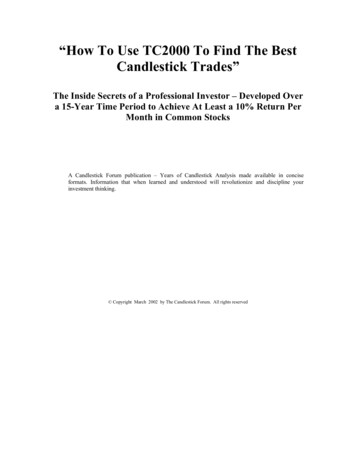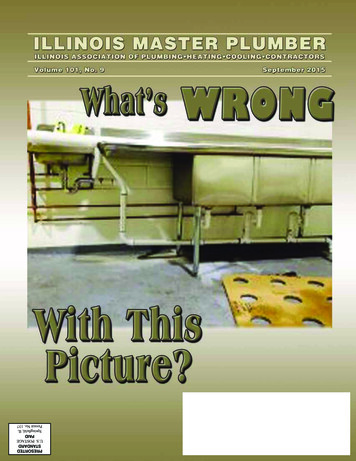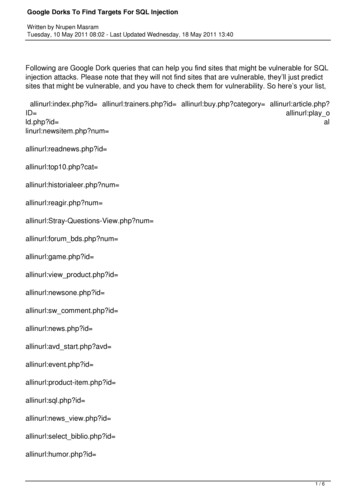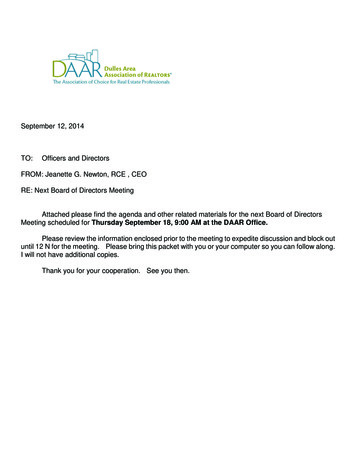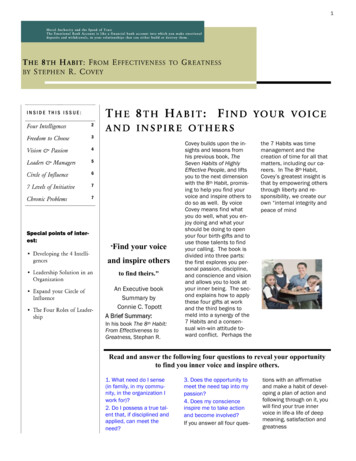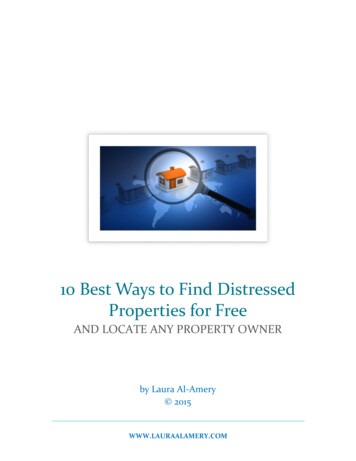
Transcription
10 Best Ways to Find DistressedProperties for FreeAND LOCATE ANY PROPERTY OWNERby Laura Al-Amery 2015WWW.LAURAALAMERY.COM
The 10 Best Ways to Find DistressedPropertiesYour best bet in locating distressed/highly discounted properties is tolocate the “Don’t Wanters.” Here are the 10 best ways that I use tolocate these owners:Owners in Delinquent Status:When I refer to properties in delinquent status, it is not just referringto mortgages, but also Taxes.Mortgage/Pre-Foreclosures – the most motivated owners are theones with a definite foreclosure date. You can locate these propertiesin the Legal Paper for your County (Google: Legal Paper CountyName)Taxes – locate owners who are just weeks away from the tax auctiondate. You can get the list of tax delinquent properties from the TaxAssessor’s Office or the Collector of Revenue Office of your County.PAGE 1
Divorce Proceedings and Bankruptcies – owners who are goingthrough a divorce proceeding or bankruptcy are also most likelyinterested in selling their property. These public notices are alsopublished in the local county legal paper.Abandoned or Vacant:As you “farm” an area or “drive for dollars,” you will find a lot ofvacant homes. These properties might follow in one of thesecategories: probate, out of town/absentee owners, REO Bank orGovernment owned.Probate – when a home owner dies, the property goes into probateand the probate trustee/attorney is responsible in assigning theproperty to the right heirs or the State. You can locate probateproperties in the Legal Paper for your County.Out of Town Owners – these are owners who have relocated, andkeep the property as an investment, rental or vacant, just waiting forthe market conditions to change or simply they have not got around toselling the property yet. There are several sources of getting lists ofthese owners: title companies have this information and also crisscross directories like Haines.comREO or Bank Owned – these are properties that have already beenforeclosed and now the bank owns them. Most of these properties sitvacant. The banks usually list these properties on the MLS (MultipleListing Service,) unless they sit in “shadow inventory” waiting to belisted. A lot of these properties have some type of paperwork displayedon the front door or window with the phone number and name of theasset manager or agent.HUD or Government Properties – A HUD home is a 1-to-4 unitresidential property acquired by HUD as a result of a foreclosure actionon an FHA-insured mortgage. You can find these homes on the HUDwebsite. Fannie Mae has also a site for their foreclosures atHomePath.com and Freddie Mac at HomeSteps.com.PAGE 2
Elderly Owners:Aging Population – with a high percentage of aging population (BabyBoomers are entering that phase in their life) and improving economicconditions, we are seeing elderly home owners and landlordsinterested in relocating or selling their rental properties. For instance,just by doing a demographic search of people over 60 years of agewho have owned properties in a certain area for at least 10 years, youare going to find out that this sample population might be moreresponsive to a direct marketing campaign. You can purchase listsbased on demographics by any mailing list company or Haines.com.Specialty Strategies:MLS Strategy - this is a simple strategy that I have employed formost of my real estate career. You are basically performing an MLSsearch in a specific area for properties that have been on the marketfor at least 90 days and submit offers in bulk (much lower than theMLS listed price), put them under contract and resell them or assignthe contract at a price still below what is listed on the MLS. If you wantto find out more about this strategy, including contracts, negotiationtips and more, I have a course called MLS Strategy.FSBO or For Sale by Owner - Some of the best deals I’ve foundhave come from walking up to a house that has a FSBO sign in thefront yard. These are often motivated sellers that can be interested inavoiding foreclosure and saving their credit rating. They can often bevery flexible in the kind of offer they are willing to entertain and alsocan be educated to other strategies like Lease Options and Subject To.If you are interested in learning more about Lease Options and SubjectTo, I also have a course on that strategy, which includes forms andhow to structure a deal.PAGE 3
CHECKLIST ON HOW TO LOCATE ANYPROPERTY OWNERRecorder of Deeds OfficeReal Estate Tax Assessor’s OfficeIf the owner is a business entity – check the Secretary ofState Business Registration division. They will have the businessowner name, address and phone number.If the owner is an individual – check Whitepages.com or411.com online directories.Criss-Cross Directories like Haines.com – you can also findHaines Directory at several larger libraries in their ResourceDepartment.Court/Lawsuit Records – most homeowners in distress havelawsuits or pending judgments (i.e. credit card companies, carloans.) Creditors have probably the most up to date informationon their debtors.Voter Records/Election Department;Tenants and Neighbors – walk around and talk to theneighbors or tenants, if the property is occupied. Someone willknow where the owner is or/and how to get hold of him/her.Skip Tracing Service – Credit companies, Accurint.com(probably one of the best resources, but expensive,)TransUnion.com, spokeo.com, searchbug.com, intelius.comFor more Resources andTraining don’t forget to checkwww.lauraalamery.comPAGE 4
The 10 Best Ways to Find Distressed Properties Your best bet in locating distressed/highly discounted properties is to locate the “Don’t Wanters.” Here are the 10 best ways that I use to locate these owners: Owners in Delinquent Status: When I refer to properties in delinquent statu
